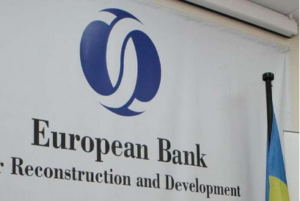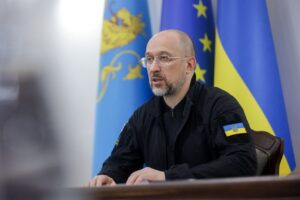
Ukraine’s economy may grow by about 4% in 2025, but the outlook remains fragile and depends entirely on external factors. This is stated in the latest report of the European Bank for Reconstruction and Development (EBRD) Regional Economic Prospects: Under Pressure.
According to the document, the main source of support for the Ukrainian economy is international financial aid, which is used to cover budget expenditures, social payments and defense. An additional driver of growth is the export of agricultural products through the EU “solidarity corridors” and alternative routes along the Danube and overland, which partially compensates for restrictions on maritime transportation.
There has also been a gradual recovery of infrastructure, including roads, bridges and the power grid, which is supporting economic activity.
However, the EBRD warns of high risks. Among them are a protracted war, high levels of public debt and inflation, as well as the vulnerability of export flows, which could be sharply reduced if sea routes are blocked.
According to the bank’s experts, digitalization of public services, agro-technology and development of renewable energy remain promising areas for Ukraine. However, this requires sustainable peace or conflict freezing, deeper integration with the EU market, as well as progress in judicial and anti-corruption reforms.
At the end of 2024, Ukraine’s GDP was estimated at around $160 bln. More than 60% of exports were agro-products (grain, oilseeds and processed products). The metallurgy, IT and energy sectors also retain potential for recovery.
The EBRD emphasizes that the Ukrainian economy is “under pressure”, but with continued international support and access to external markets, it can grow rapidly, laying the foundations for post-war transformation.

Over the past three and a half years, Ukraine has received more than $145 billion in international financial aid, which has allowed it to maintain macro-financial stability amid a full-scale war and guarantee all necessary social spending, Finance Minister Serhiy Marchenko said during a series of bilateral meetings with finance and economy ministers from G7 countries and the EU, representatives of the European Commission and the IMF on September 20 in Copenhagen.
“Given that the war continues, the challenges for the financial system remain, and continued external support is extremely important. In 2025 alone, more than $30.6 billion in external financing has already been attracted, and the need for the current year is $39.3 billion,” the Ministry of Finance quoted him as saying in a press release on its website.
It is noted that the minister discussed with his colleagues options for additional financial support for Ukraine, in particular, the possibility of implementing the European Commission’s recently presented initiative on a reparations loan guaranteed by frozen Russian assets.
As specified by the Ministry of Finance, as part of the G7 Extraordinary Revenue Acceleration for Ukraine (ERA) initiative worth $50 billion, Ukraine has received about $23 billion from its partners since the end of last year from the proceeds of frozen Russian assets.
Marchenko noted the support of the Canadian and EU governments for the initiative. In particular, Canada’s contribution to ERA is CAD 5 billion (about $3.4 billion), and the EU’s contribution is EUR 18.1 billion (about $20 billion).
In addition, the minister stressed that the government continues to work on implementing the necessary reforms for the implementation of the EU’s Ukraine Facility financial instrument for 2024-2027 in the amount of EUR 50 billion, within which more than EUR 22.6 billion has already been raised.
The Ministry of Finance specified that negotiations were held with Canadian Finance Minister François-Philippe Champagne, Danish Minister of Economy Stephanie Løse, European Commissioner for Financial Services, Savings, and Investments Maria Luisa Albuquerque, and Director of the IMF’s European Department Alfred Kemmer. The parties discussed the state of Ukraine’s financial system, budgetary needs for 2026, new mechanisms for budgetary support for Ukraine, and reforms.
In particular, Marchenko discussed with Kämmer the possibility of launching a new cooperation program with the IMF by the end of the year, a request for which the Ukrainian side recently sent to the Fund.
Earlier, the finance minister estimated Ukraine’s external financing needs in 2026 at $45.5 billion, and the total amount of external financing required for the period of the new four-year program with the IMF at $150 to $170 billion.
As reported, the current four-year EFF extended financing program with the IMF in the amount of $15.6 billion, which was approved in March 2023, initially provided for a total of $115 billion in external financing for Ukraine with the participation of international partners in the baseline scenario and $140 billion in the negative scenario, but with the delay in entering the war, these figures were increased to $153 billion and $165 billion, respectively.

Ukraine will need at least $120 billion next year if the war unleashed by Russia continues, in order to hold the front line and minimize the number of lives lost among its defenders, Ukrainian Defense Minister Denys Shmyhal reiterated his July assessment at the annual YES conference “How to End the War,” organized by the Pinchuk Foundation in Kyiv on September 12-13.
“If the war ends, we will need a slightly smaller amount to simply keep our army in good shape in case of secondary aggression from the Russian side,” Shmyhal said.
“The economics of war show that if we spend less money than Russia, then we start paying with our territories and, most importantly, with our lives. Therefore, we need to attract all the necessary resources, all the necessary money,” he stressed.
The defense minister acknowledged that after three and a half years, many taxpayers are exhausted from spending such a huge amount of money, so he spoke in favor of using frozen Russian assets until Russia compensates for all the expenses that Ukraine and all countries have incurred during this wartime.
In his opinion, such a solution can be found even without direct confiscation, because the legal complexity of this procedure is understandable.
“We need to have a stable source of funding to finance Ukraine’s defense and reconstruction. Therefore, the number one issue for all of us is to find a political and legal solution for the use of frozen Russian assets,” Shmygal said.
He highlighted three main priorities: supplying the Defense Forces with more FPV drones, more robotic systems, and artillery shells, including long-range ones; sky defense—both with Patriots against ballistic missiles and with interceptor drones against drones; long-range weapons—Ukrainian-made drones and missiles.
“If our Western partners provide us with more deep strike systems and equipment, we will be absolutely delighted. But we can produce our own deep strike weapons, and again, we need funding,” the defense minister said.
He explained that such long-range strikes put the most pressure on the Russian economy and society, as well as directly on Putin, because they allow for the destruction of their oil refineries and military production infrastructure.
“We need to produce more, we need to continue carpet bombing operations, when all the planes in the Moscow region are grounded day after day. This is very inconvenient for the Moscow elite, and they are directly telling Putin: let’s stop this war because we can’t fly,” Shmygal added.
According to him, he conveys these needs during meetings in the Rammstein format.
In addition, the defense minister announced the need to create a so-called Kill Zone, which is currently being formed on the front line, to prevent aggression from recurring in the future. “These are lines of drones covering 10, 15, or even 30 km of territory,” he explained.
According to estimates by Alexander Parashchiy, head of the analytical department at investment company Concorde Capital, defense and security spending in 2024 amounted to approximately $95 billion, while this year he predicted it would grow to approximately $100-105 billion. Approximately half of this amount comes from the budget, while the other half has been provided by partners until recently.
In addition, Ukraine attracts about $40 billion in external financial assistance annually for non-military purposes in order to be able to finance military needs from the budget. For next year, Finance Minister Serhiy Marchenko has estimated the need for external financing of the state budget deficit at $45 billion, of which EUR16 billion has not yet been secured.
CONFERENCE, SHMYHAL, WAR, ЄС

Approximately 5.7 million people from Ukraine remain displaced worldwide, 3.8 million are internally displaced, and 4.1 million have returned from displacement either within Ukraine or from abroad, according to the International Organization for Migration (IOM).
“Displacement remains a defining feature of the crisis,” said an IOM spokesperson in a statement on the recent attacks in Ukraine, published on the organization’s website on Tuesday.
IOM also expresses deep concern about the continuing rise in civilian casualties across Ukraine and stresses the urgent need for measures that prioritize the protection of civilians and provide necessary humanitarian assistance.
“The civilian population of Ukraine continues to bear the heavy burden of war as Russian strikes hit towns and villages on the front line and beyond. In July 2025 alone, the Office of the United Nations High Commissioner for Human Rights recorded 286 deaths and 1,388 injuries, the highest monthly figure since May 2022,” the statement said.
The IOM also stresses the urgent need for measures that prioritize the protection of civilians and provide necessary humanitarian assistance.
IOM, UKRAINIANS, WAR

In a week or two, it will be clear whether the war will end or the fighting will continue, according to US President Donald Trump.
“I think President Putin wants to find an answer, and we’ll see. And if after a certain amount of time, not too far from today, a week or two, we’ll know whether we’ve solved this problem or whether these terrible battles will continue. We will do everything we can to put an end to this,“ Trump said before meeting with Ukrainian President Volodymyr Zelensky and European leaders.
He noted that there are two sides ”that want to make a deal.”
“And it’s possible that it won’t work out. On the other hand, it’s possible that it will work out. And we will save thousands and thousands of lives every week. So this is what we really have to do. Or at least we have to make every effort. But I think we can get a very good result,” Trump stressed.

If a trilateral meeting between US President Donald Trump, Ukrainian President Volodymyr Zelensky, and Russian President Vladimir Putin takes place, the war could end before Christmas (December 25), according to Republican Senator Lindsey Graham.
“If a trilateral meeting between US President Donald Trump, President Zelensky and Putin takes place, I am cautiously optimistic that this war will end well before Christmas,” he wrote on social media.
“If the meeting does not take place, I think President Trump could impose serious consequences on Putin and those who buy his oil and gas,” Graham predicts.